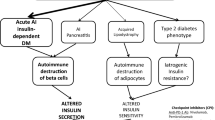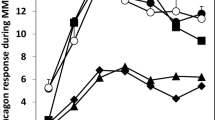Abstract
Programmed cell death-1 and programmed death ligand 1 (PD-1/PD-L1) inhibitors trigger an immune-mediated anti-tumour response by promoting the activation of cytotoxic T lymphocytes. Although proven to be highly effective in the treatment of several malignancies they can induce significant immune-related adverse events (irAEs) including endocrinopathies, most commonly hypophysitis and thyroid dysfunction, and rarely autoimmune diabetes. Here we present the first case report of a patient with a primary diagnosis of urothelial cancer developing PD-L1 inhibitor-induced autoimmune diabetes. A euglycemic 57 year old male presented to clinic with dehydration after the fifth cycle of treatment with the novel PD-L1 inhibitor atezolizumab. Blood tests demonstrated rapid onset hyperglycaemia (BM 24 mmol/L), ketosis and a low C-peptide level (0.65 ng/mL) confirming the diagnosis of type 1 diabetes. He responded well to insulin therapy and was discharged with stable blood glucose levels. Due to the widening use of PD-1/PD-L1 inhibitors in cancer treatment clinicians need to be aware of this rare yet treatable irAE. Given the morbidity and mortality associated with undiagnosed autoimmune diabetes we recommend routine HbA1c and plasma glucose testing in all patients prior to and during treatment with PD-1/PD-L1 inhibitors until more evidence has accumulated on identifying those patients with a pre-treatment risk of such irAEs.



Similar content being viewed by others
References
Postow MA, Callahan MK, Wolchok JD. Immune checkpoint blockade in cancer therapy. J Clin Oncol. 2015;33:1974–82.
Tartari F, Santoni M, Burattini L, Mazzanti P, Onofri A, Berardi R. Economic sustainability of anti-PD-1 agents nivolumab and pembrolizumab in cancer patients: recent insights and future challenges. Cancer Treat Rev. 2016;48:20–4.
Rosenberg JE, Hoffman-Censits J, Powles T, et al. Atezolizumab in patients with locally advanced and metastatic urothelial carcinoma who have progressed following treatment with platinum-based chemotherapy: a single-arm, multicentre, phase 2 trial. Lancet. 2016;387(10031):1909–20.
Keir ME, Liang SC, Guleria I, et al. Tissue expression of PD-L1 mediates peripheral T cell tolerance. J Exp Med. 2006;203:883–95.
Topalian SL, Hodi FS, Brahmer JR, et al. Safety, activity, and immune correlates of anti-PD-1 antibody in cancer. N Engl J Med. 2012;366:2443–54.
Brahmer JR, Tykodi SS, Chow LQ, et al. Safety and activity of anti-PD-L1 antibody in patients with advanced cancer. N Engl J Med. 2012;366:2455–65.
Gangadhar TC, Vonderheide RH. Mitigating the toxic effects of anticancer immunotherapy. Nat Rev Clin Oncol. 2014;11:91–9.
Gonzalez-Rodriguez E, Rodriguez-Abreu D. Spanish group for cancer immuno-biotherapy (GETICA). immune checkpoint inhibitors: review and management of endocrine adverse events. Oncologist. 2016;21:804–16.
Joshi MN, Whitelaw BC, Palomar MT, Wu Y, Carroll PV. Immune checkpoint inhibitor-related hypophysitis and endocrine dysfunction: clinical review. Clin Endocrinol. 2016;85:331–9.
Pardoll DM. The blockade of immune checkpoints in cancer immunotherapy. Nat Rev Cancer. 2012;12:252–64.
Ansari MJ, Salama AD, Chitnis T, et al. The programmed death-1 (PD-1) pathway regulates autoimmune diabetes in nonobese diabetic (NOD) mice. J Exp Med. 2003;198:63–9.
Wang J, Yoshida T, Nakaki F, Hiai H, Okazaki T, Honjo T. Establishment of NOD-Pdcd1 −/− mice as an efficient animal model of type I diabetes. Proc Natl Acad Sci U S A. 2005;102:11823–8.
Kochupurakkal NM, Kruger AJ, Tripathi S, et al. Blockade of the programmed death-1 (PD1) pathway undermines potent genetic protection from type 1 diabetes. PLoS One. 2014;9, e89561.
Fujisawa R, Haseda F, Tsutsumi C, et al. Low programmed cell death-1 (PD-1) expression in peripheral CD4(+) T cells in Japanese patients with autoimmune type 1 diabetes. Clin Exp Immunol. 2015;180:452–7.
Martin-Liberal J, Furness AJ, Joshi K, Peggs KS, Quezada SA, Larkin J. Anti-programmed cell death-1 therapy and insulin-dependent diabetes: a case report. Cancer Immunol Immunother. 2015;64:765–7.
Hughes J, Vudattu N, Sznol M, et al. Precipitation of autoimmune diabetes with anti-PD-1 immunotherapy. Diabetes Care. 2015;38(4):e55–7.
Mellati M, Eaton KD, Brooks-Worrell BM, et al. Anti-PD-1 and anti-PDL-1 monoclonal antibodies causing type 1 diabetes. Diabetes Care. 2015;38:e137–8.
Gaudy C, Clevy C, Monestier S, et al. Anti-PD1 pembrolizumab can induce exceptional fulminant type 1 diabetes. Diabetes Care. 2015;38:e182–3.
Okamoto M, Okamoto M, Gotoh K, et al. Fulminant type 1 diabetes mellitus with anti-programmed cell death-1 therapy. J Diabetes Investig. 2016;7(6):915–918.
Miyoshi Y, Ogawa O, Oyama Y. Nivolumab, an anti-programmed cell death-1 antibody, induces fulminant type 1 diabetes. Tohoku J Exp Med. 2016;239:155–8.
Noble JA, Erlich HA. Genetics of type 1 diabetes. Cold Spring Harb Perspect Med. 2012;2:a007732.
Wang B, Andre I, Gonzalez A, et al. Interferon-gamma impacts at multiple points during the progression of autoimmune diabetes. Proc Natl Acad Sci U S A. 1997;94:13844–9.
Serreze DV, Post CM, Chapman HD, Johnson EA, Lu B, Rothman PB. Interferon-gamma receptor signaling is dispensable in the development of autoimmune type 1 diabetes in NOD mice. Diabetes. 2000;49:2007–11.
Yang Z, Chen M, Ellett JD, et al. Autoimmune diabetes is blocked in Stat4-deficient mice. J Autoimmun. 2004;22:191–200.
Imagawa A, Hanafusa T, Awata T, et al. Report of the committee of the Japan diabetes society on the research of fulminant and acute-onset type 1 diabetes mellitus: new diagnostic criteria of fulminant type 1 diabetes mellitus. J Diabetes Investig. 2012;3:536–9.
Bertrand A, Kostine M, Barnetche T, Truchetet ME, Schaeverbeke T. Immune related adverse events associated with anti-CTLA-4 antibodies: systematic review and meta-analysis. BMC Med. 2015;13:211.
Johnson DB, Sullivan RJ, Ott PA, et al. Ipilimumab therapy in patients with advanced melanoma and preexisting autoimmune disorders. JAMA Oncol. 2016;2:234–40.
Menzies AM, Johnson DB, Ramanujam S, Atkinson VG, Wong AN, Park JJ, et al. Anti-PD-1 therapy in patients with advanced melanoma and preexisting autoimmune disorders or major toxicity with ipilimumab. Ann Oncol. 2016. doi:10.1093/annonc/mdw443
Hodi FS, Kluger H, Sznol M, Carvajal RD, Lawrence D, Atkins MB, et al. Durable, long-term survival in previously treated patients with advanced melanoma (mel) who received nivolumab (nivo) monotherapy in a phase 1 trial. Cancer Res. 2016;76(14 Supplement):CT001.
Author information
Authors and Affiliations
Corresponding author
Ethics declarations
Funding
None.
Conflict of Interest
Andrew Protheroe has received research funding from MERCK as part of their global investment programme, honoraria from Ipsen, Bayer, Astellas and Janssen, received financial support from Bristol-Myers Squibb and payment for speakers fees from Janssen and Astellas. Avinash Gupta has received honoraria and financial support from Bristol-Myers Squibb. The rest of the authors have no conflicts of interests to disclose.
Rights and permissions
About this article
Cite this article
Hickmott, L., De La Peña, H., Turner, H. et al. Anti-PD-L1 atezolizumab-Induced Autoimmune Diabetes: a Case Report and Review of the Literature. Targ Oncol 12, 235–241 (2017). https://doi.org/10.1007/s11523-017-0480-y
Published:
Issue Date:
DOI: https://doi.org/10.1007/s11523-017-0480-y




